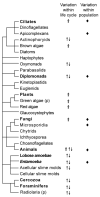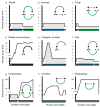The dynamic nature of eukaryotic genomes
- PMID: 18258610
- PMCID: PMC2933061
- DOI: 10.1093/molbev/msn032
The dynamic nature of eukaryotic genomes
Abstract
Analyses of diverse eukaryotes reveal that genomes are dynamic, sometimes dramatically so. In numerous lineages across the eukaryotic tree of life, DNA content varies within individuals throughout life cycles and among individuals within species. Discovery of examples of genome dynamism is accelerating as genome sequences are completed from diverse eukaryotes. Though much is known about genomes in animals, fungi, and plants, these lineages represent only 3 of the 60-200 lineages of eukaryotes. Here, we discuss diverse genomic strategies in exemplar eukaryotic lineages, including numerous microbial eukaryotes, to reveal dramatic variation that challenges established views of genome evolution. For example, in the life cycle of some members of the "radiolaria," ploidy increases from haploid (N) to approximately 1,000N, whereas intrapopulation variability of the enteric parasite Entamoeba ranges from 4N to 40N. Variation has also been found within our own species, with substantial differences in both gene content and chromosome lengths between individuals. Data on the dynamic nature of genomes shift the perception of the genome from being fixed and characteristic of a species (typological) to plastic due to variation within and between species.
Figures




References
-
- Adam RD. The Giardia lamblia genome. International Journal for Parasitology. 2000;30:475–484. - PubMed
-
- Adl SM, Simpson AGB, Farmer MA, Andersen RA, Anderson OR, Barta JR, Browser SS, Brugerolle G, Fensome RA, Fredericq S, James TY, Karpov S, Kugrens P, Krug J, Lane CE, Lewis LA, Lodge J, Lynn DH, Mann DG, McCourt RM, Mendoza L, Moestrup O, Mozley-Standridge SE, Nerad TA, Shearer CA, Smirnov AV, Spiegel FW, Taylor M. The new higher level classification of eukaryotes with emphasis on the taxonomy of protists. Journal of Eukaryotic Microbiology. 2005;52:399–451. - PubMed
-
- Afonkin SJ. Spontaneous depolyploidization of cells in Amoeba clones with increased nuclear-DNA content. Archiv Für Protistenkunde. 1986;131:101–112.
-
- Angert ER. Alternatives to binary fission in bacteria. Nature Reviews Microbiology. 2005;3:214–224. - PubMed
Publication types
MeSH terms
Substances
Grants and funding
LinkOut - more resources
Full Text Sources

